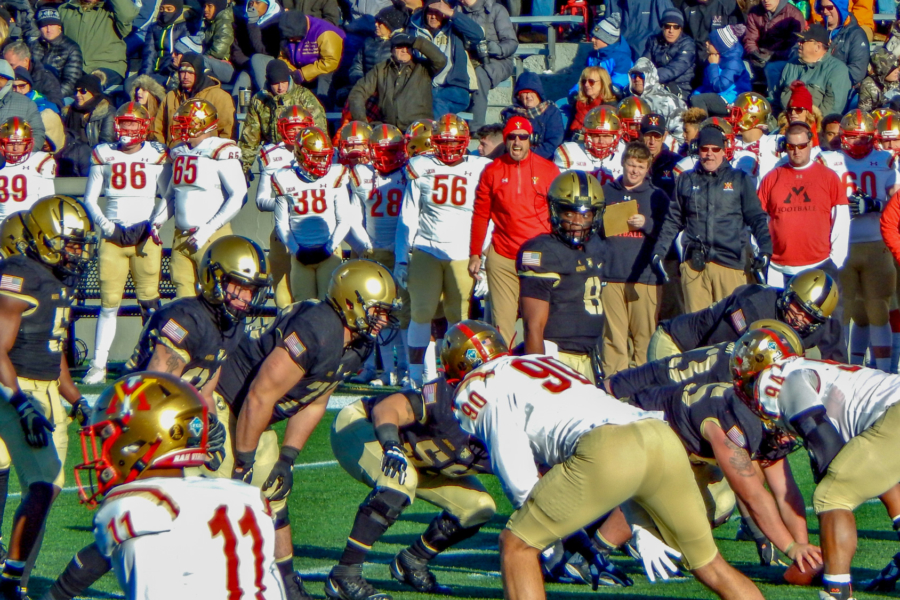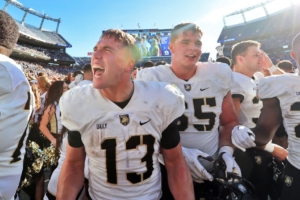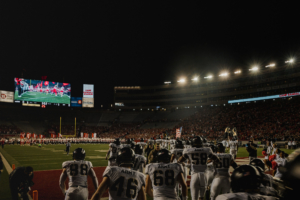Today we are going to talk about FCS football in a way that has nothing to do with Army. Usually we only talk about our friends in the FCS when they are coming to Michie Stadium to get their teeth kicked in. However, last night on ESPN2, David Pollack made a suggestion that really resonated with me. He noted that the FCS has planned to play their season in the spring due to COVID-19 and suggested that maybe the FCS should always play their season in the spring. Like many of you, my gut reaction was to make a face and think of all the reasons that it was impossible and improbable to change college football. Then it dawned on me, that idea makes a lot of sense in a lot of ways. Sure, there are issues and barriers, but I believe that the upsides outweigh the negatives.
What if FCS football permanently moved to being played in the spring?@davidpollack47 wouldn't mind the idea of more football to watch year round ? pic.twitter.com/g4fJ0S2GwM
— ESPN College Football (@ESPNCFB) July 21, 2020
Why We SHOULD Play FCS Football in the Spring:
1. Very few, if any, FCS programs have a TV deal. Despite the fact that some programs can bring tens of thousands of fans into games, they still have to compete with FBS and Power Five programs that vastly outweigh them in terms of total viewership and fan base.
The FCS doesn’t stand a fighting chance for a TV deal in the fall, but they would in the spring.
With no other football to contend with, the FCS would be able to negotiate TV deals which would increase revenue and exposure. Would people watch? Hell yeah they would! The Alliance of American Football (R.I.P.) proved that people will watch football year round. In its first and only season, the Alliance performed great in the ratings, even pulling in 2.9M viewers when slated against the prime-time NBA matchup on ABC of the Houston Rockets and OKC Thunder (2.5M views). The XFL performed even better! People want to watch football in the spring, bottom line.
2. How many FCS players go to the NFL every year? Great question and thanks for asking. Personally, I had to google this one because I had no idea. The answer for 2020 was six. Out of 126 schools, only six players got drafted.
Would that number go up if FCS played in the spring? Maybe. I would be willing to bet that there are a lot of talented players who never get the chance to be seen or heard of because of all the noise about the FBS during the fall. Will that number double if the FCS plays in the spring? I don’t know. But I would be willing to bet that more players will get an invite to camp if they perform well.
3. Moving the FCS to the spring would effectively get rid of the “guaranteed” win everyone puts on their schedule. One FCS win can count towards bowl eligibility regardless, so most every FBS teams schedules exactly one FCS school in order to get that much closer to a bowl game.
At the end of the day, however, that game really does nothing for the FBS programs in terms of ranking. How do you evaluate a team that’s in a different league? You can’t. Plus, those games make strength of schedule calculations infinitely more difficult. Is a win over a dominant FCS foe better than a win over a FBS bottom feeder? Don’t know. Eliminate the confusion and have each league play within their league. The NFL doesn’t play college programs and the FBS shouldn’t play the FCS.
4. Yale and Harvard is perhaps the greatest rivalry in the FCS. But is it great football? Not really. However, the pageantry of the game is always cool and the pranks are usually worth a few laughs. Unfortunately, this game usually gets buried on rivalry weekend, so that no one watches it.
It would be really great if we could find a way to highlight some of the programs and players in the FCS, but that is not going to happen while they play in the fall and compete against the FBS for viewers. Frankly, I didn’t even know Marist had an FCS Football program until researching this article, and we all went to school just 45 minutes down the river from them. Having a separate season would give FCS programs and players recognition, strengthen their alumni bases, and bring in new fans of the league.
In case you missed it, @CoachTimMurphy joined #MartyandMcGee on @ESPNRadio to discuss the Ivy League’s recent announcement and the current college football landscape.
— Harvard Football (@HarvardFootball) July 13, 2020
Why We SHOULD NOT Play FCS Football in the Spring:
1. Not every school is a football school. Some are basketball and a lot are lacrosse. Moving football to the spring would directly compete with both of those sports in terms of interest, and it would compete with lacrosse for real estate. Army’s own Patriot League has a legitimate lacrosse power houses in Loyola and rising powers in Bucknell and Lafayette. Alas, none of those schools have an extra stadium laying around.
Obviously college lacrosse is a growing sport and schools don’t want to cannibalize their own market, but I think any logistical details could be easily ironed out. After that you let the market decide what they want to watch on TV, and go from there.
Pro lacrosse was back this weekend with Brian Begley (@DenverOutlaws), Jack Carrigan (@LizardsLacrosse) & @PTRICCI1 (@phillybarrage) on the field in Annapolis!#gohounds @LoyolaMDAlumni @PatriotLeague
? by @MLL_Lacrosse pic.twitter.com/7I89MXh0HD— Loyola Men's Lax (@LoyolaMLAX) July 20, 2020
2. The majority of the FCS programs are on the East Coast and quite a few are in the North East. As we all know, it tends to snow during the early spring months. Is this unfortunate and annoying? Absolutely. Is it a deal breaker? It shouldn’t be.
3. If you follow Army Football you know that our own beloved Coach Jeff Monken came to us from a (then) FCS school in Georgia Southern. Monken shocked the world when he marched his team into Gainesville, Florida, and took down the Gators without throwing a single pass. This was an incredible moment for sports, and moving FCS to the spring would eliminate even its possibility. Also, football has been played in the fall for 150 years and moving the schedule to the spring borders on sacrilege.
But here’s the thing: we all remember when an FCS team upsets a FBS great. But no one remembers when said FBS team loses by 60 or 70 points. Sure, it’s a gamble that they are willing to take to be on TV and often they are getting paid to lose. But in my opinion, getting a TV deal and playing competitively in a league of your peers is a better long term business decision than praying to the upset gods for a win and minimal injuries.
No one remembers a flash in the pan from an FCS school in the fall. Unless it is an actual upset, a great performance is forgotten after a week. But being on TV every weekend in the spring is how FCS schools can build programs and fan bases that last. To me, that outweighs the loss of a big game and a change in tradition.
Final Thoughts
Permanently moving FCS Football to the spring would be a huge move for the FCS conference and their fans. I don’t want to make light of that and I understand that it would require an enormous transition. It would be rough — at first. However, it’s an interesting one and one that should be explored.
I obviously don’t know every detail of what that transition would entail and I don’t claim to. However, I do understand business and I think that this move would be the right business decision for the FCS. Assuming the FBS plays in the fall this year, the FCS would have a great “free trial” of what football in the spring would look like. We are living in unprecedented times and while drastic, this might be a great long term move for our friends in the Football Championship Subdivision.
Oh yeah, Beat Navy!











